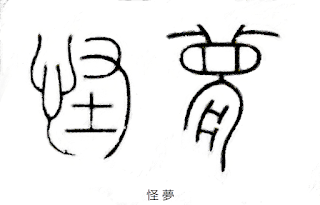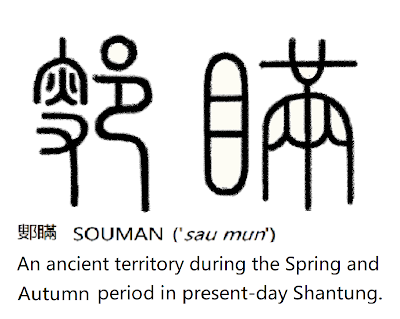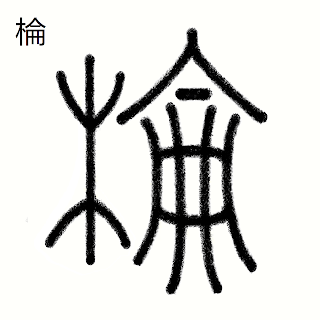You may have noticed that I tend toward English spellings instead of American ones in some cases. This is not sheer perversity, but because the American standard just looks wrong. Centre, colour, spectre, hiccough. It probably in some way reflects my age when I became aware of the word, seeing as we had books published in England at home, and there wasn't an educator who would throw hissy fits if I spelled it by his or her standards incorrectly. It also works in reverse: elevator instead of lift, raincoat or windbreaker in lieu of cagoule (dang you Brits are weird), rainboots rather than Wellingtons or Wellies, and math or mathematics over "maths". That latter is painfully berserk; Brits, get with the programme, dagnabbit!
[I was taught how to read and write in Dutch at school. English literacy I acquired on my own.]
So naturally I get a wee peevish when faced with modern Chinese from the Mainland, which uses simplified characters. For instance 咸 ('
haam'; together, all complete, unified) instead of 鹹 ('
haam'; salty, briny, steeped in pickling liquid, stingy). Same pronunciations, and the first character is rarely used by its original meaning, so contextually it will be quite clear what is actually meant, though it still looks wrong. Likewise, 万 ('
man'; ten thousand, a myriad) for accounting purposes (where there have always been alternate forms) isn't too horrible.
Stupid looking, but I'll grudgingly let it pass. Should actually be 萬 ('
man'; an obsolete word for a kind of scorpion that sounded conveniently the same as the word for myriad and was borrowed for that purpose a very long time ago).
I am currently looking at a box of tasty snack biscuits. In English: "cake seasoned with meat floss". In Chinese characters: 肉松饼 ('
yiuk sung beng'), which correctly should be 肉鬆餅 lest people like me read it as "meat, pine, and a goofy glyph". The last character (饼) simply looks funky, though the phonetic element (并) is clear: beng. By itself it signifies combination, annexed, and 'und so weiter'.
However, it's that second simplified character which irritates me unreasonably.
Why on earth would you take the phonetic element (松) and use it instead of the correct character (鬆), when by itself it is still in use in the modern language?
That's not logical, but just plain lazy!
The fact that there is no seal script or ancient bronze inscription of the word which looks like my speculative rendering of 鬆 above makes no difference; there should be one, irrespective of that word not having existed two and a half millennia ago, and the picture above shows what it would have looked like. Pine (松) did exist at that time. Please respect it.
Characters are not silly putty that can be bent and twisted at whim.
I literarily don't care that it's become common.
By the way, the jinwen script version of 萬 is shown below:
Secondary meanings, besides scorpion, are trance-dancing and sorcery, sometimes the daemonically possessed shamanesses beloved by simple peasant types.
Jinwen (bronze inscriptions) predate seal script.
And is often more elegant, I think.
==========================================================================
NOTE: Readers may contact me directly:
LETTER BOX.
All correspondence will be kept in confidence.
==========================================================================





























